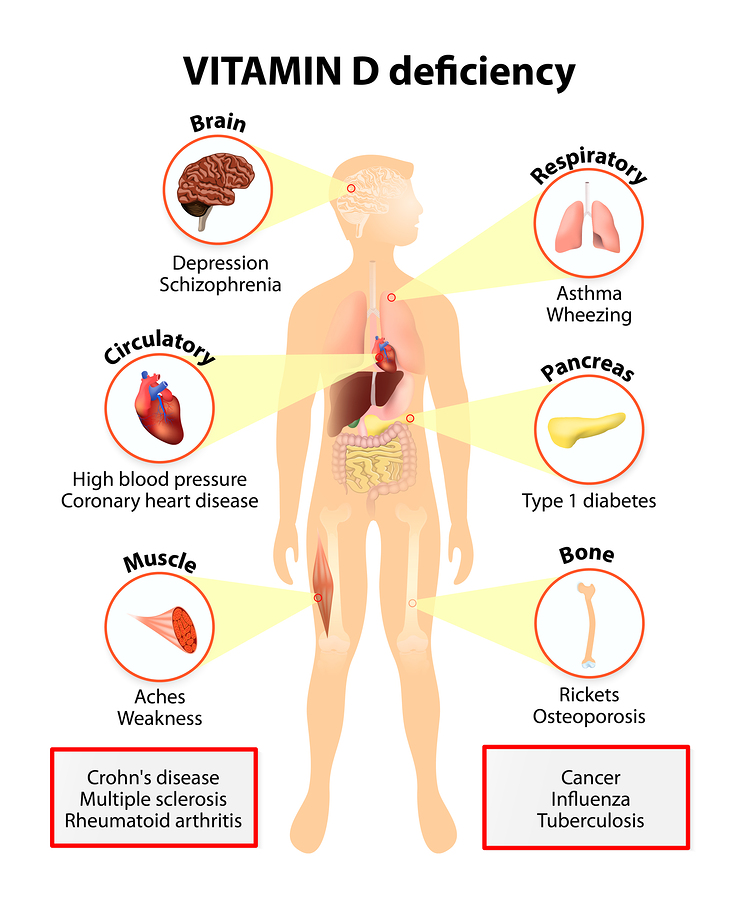Recent research continues to show the importance of Vitamin D but few understand the difference between vitamin D3 benefits over vitamin D2.

Vitamin D deficiency symptoms and diseases
Yes, there are two forms of vitamin D. Vitamin D2 is manufactured by plants or fungus. It is typically used to fortified foods like milk, cereals, and juices. This form of vitamin D is called Ergocalciferol.
Vitamin D3 is called Cholecalciferol. It is synthesized by humans and animals from sunlight. When taken in supplement form it has a longer shelf life and is better for the human body.
In a published study in the Journal of Clinical Endocrinology & Metabolism, vitamin D3 was shown to be 87% more effective in raising vitamin D levels in the blood over vitamin D2. According to the lead researcher Dr. Robert Heaney (Creigton University School of Medicine in Omaha, Nebraska),
“Given its greater potency, D3 should be the preferred treatment option when correcting vitamin D deficiency.”
Vitamin D3 Benefits
As the body of scientific research continues to grow, the number of health benefits from vitamin D3 also grows. Here is a brief summary of some of these vitamin D3 benefits:
Helps to Maintain Calcium Balance in the Bloodstream – Vitally important to cardiovascular health is the proper maintenance of your blood calcium levels. This helps to prevent calcification of the vascular wall, which leads to arteriosclerosis. Additionally, your endothelial cells, which line all of your cardiovascular system, need calcium to be able to convert the amino acid L-arginine into nitric oxide – the master signaling molecule of your entire cardiovascular system.
Helps in Blood Pressure Regulation – Recent studies have shown that vitamin D3 may decrease the risk for high blood pressure. This would make sense since proper blood calcium levels are needed to initiate the production of nitric oxide from L-arginine. Since nitric oxide is the body’s most powerful vasodilator, it is used to relax the vascular wall to help control blood pressure.
Additionally, vitamin D3 inhibits the enzyme renin, which is released by the kidneys. This enzyme acts to increase blood pressure. By inhibiting this enzyme, vitamin D3 helps to maintain normal blood pressures.
Has a Role in Insulin Secretion – When conditions are right for increased insulin demand, vitamin D3 can play a pivotal part in insulin secretion.
Boosts Your Immunity – Studies show vitamin D3 to be a potent immune system modulator. This enhances your immunity while helping to inhibit the development of autoimmunity.
Aids in Cell Differentiation – Cell differentiation is needed to help cells perform specific functions in your body. While cellular differentiation is needed for growth and wound healing, uncontrolled proliferation of cells can lead to cancer. The active form of vitamin D3 inhibits this proliferation and stimulates cell differentiation.
Prevention of Osteoporosis – Vitamin D3 is recognized as the best form for balancing the amount of calcium and phosphorous within your bloodstream. This is essential for bone production and development.
Vitamin D3 Benefits versus Toxicity
There is an ongoing debate regarding vitamin D3 benefits versus toxicity resulting from vitamin D overdose. Because of this the Food and Nutrition Board of the Institute of Medicine has established an intake level of 2000 IU of vitamin D3. However, many research studies suggest that this evel of 2000 IU is very conservative and that healthy people could increase their intake levels to 10,000 IU/day without side effects.
If you have questions in this area, then work with your health care provider to find the vitamin D3 intake that will bring your blood concentrations of 25(OH)D into a healthy range.
Vitamin D3 Benefits From the Method of Absorption
If you’re going to use vitamin D3 supplements to improve your vitamin D3 benefits, then make sure that the product you use is either a spray or chewable supplement. This dramatically increases absorption over supplements that you swallow. By using spray or chewable supplements you will achieve better results in a shorter period of time.
Vitamin D3 for Vegans and Vegetarians
One final area that needs to be addressed is the use of vitamin D3 for vegans and vegetarians. Here is the formal definition for each group:
Vegetarians do not eat meat, fish, or poultry. Vegans, in addition to being vegetarian, do not use other animal products and by-products such as eggs, dairy products, honey, leather, fur, silk, wool, cosmetics, and soaps derived from animal products.

Vitamin D3 benefits from sheep’s wool
Given this definition it’s important to understand the best form of vitamin D3 so that you can derive its health benefits. Vitamin D3 is an animal-derived ingredient. Socially conscious manufacturers will obtain it from the wool of healthy sheep as part of normal shearing. The lanolin, which is wool grease, is extracted from the sheep’s wool and then converted into the active form of vitamin D3.
This process would make it acceptable to vegetarians but most likely not to strict vegans. However, I would ask my vegan friends to consider a couple of items:
First, just like you get a hair cut, sheep also need a hair cut to keep them from overheating. This means the shearing of sheep’s wool is beneficial to the sheep’s health.
Second, no sheep are killed in this process.
Third, do you have pets like a cat or dog? If you do, then you’re in contact with animals all the time. By taking vitamin D3 from a responsible and socially conscious manufacturer you can derive the significantly greater benefits of vitamin D3 without feeling guilty that an animal was involved in the process.
Just some additional food for thought. I’ll leave it up to my vegan friends to make the final decision.
Blessing Lives Through Nitric Oxide Therapy!
Dan Hammer
Leave a Reply
You must be logged in to post a comment.